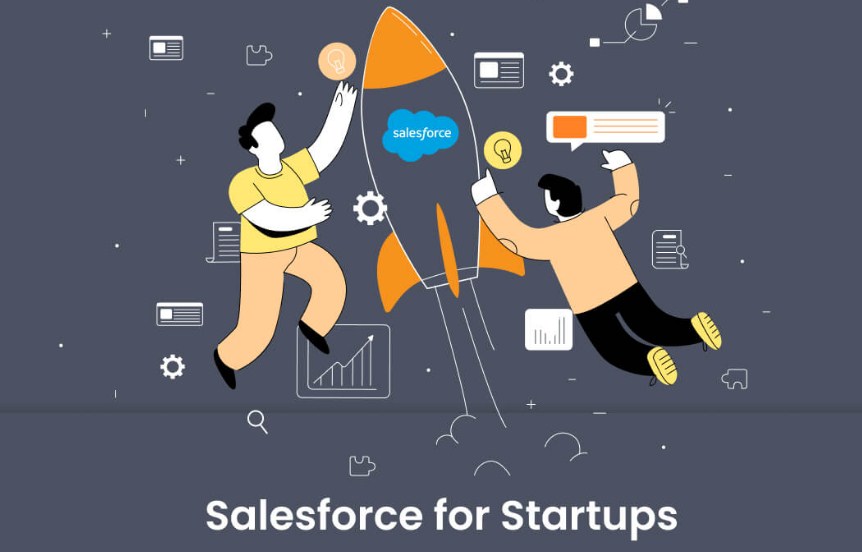Salesforce for Startups – Starting a business is an exciting journey, but it also comes with its challenges. One key aspect of business growth that often gets overlooked is how to manage customer relationships effectively. A solid Customer Relationship Management (CRM) strategy can make all the difference, and that’s where Salesforce for startups comes in.

In this article, we’ll explore why Salesforce for startups is not just a tool, but a game-changer for young businesses. From its cutting-edge features to how it benefits startups, we’ll cover it all. Plus, we’ll dive into where and how to buy Salesforce for your startup, and provide real-world examples of how other products integrate seamlessly with Salesforce.
What is Salesforce for Startups?
Salesforce is the world’s leading CRM software, known for its powerful cloud-based tools designed to streamline sales, customer service, marketing, and more. For startups, Salesforce provides an all-in-one solution that helps businesses track customer data, optimize workflows, and grow efficiently.
Key Features of Salesforce for Startups
- Customizable CRM Tools: Tailor your Salesforce environment to meet your startup’s unique needs.
- Scalability: Easily scale as your business grows without compromising performance.
- AI-Powered Insights: Leverage AI to predict trends and automate processes.
- Sales Automation: Streamline sales processes to close deals faster.
- Integration Capabilities: Connect Salesforce with other tools like Gmail, Mailchimp, and Slack.
- Marketing Automation: Reach customers with targeted campaigns to boost conversions.
Why Startups Should Use Salesforce
For startups, it’s crucial to manage customer relationships right from the start. Using Salesforce can provide several benefits to a growing business. Let’s break down the key advantages:
1. Improved Efficiency and Time Management
Salesforce’s automation features help startups save time on repetitive tasks like data entry, follow-ups, and campaign tracking. This automation boosts productivity and lets your team focus on strategic tasks.
2. Better Customer Insights
Salesforce offers detailed customer data, from purchase behavior to interaction history. This helps startups create more personalized marketing strategies and sales approaches. You’ll understand your customers better and increase your chances of success.
3. Scalable Growth
Salesforce is designed to grow with your startup. As you expand your customer base, the platform adjusts to meet your needs. Whether you need more storage or additional features, Salesforce can scale effortlessly to accommodate your business.
4. Affordable for Startups
Salesforce provides pricing tiers that suit the budget of a growing startup. With the Salesforce Essentials package, you can start with a low monthly fee, ensuring that you don’t overspend in the early stages of your business.
Real-World Examples of Salesforce Integrations for Startups

Several products integrate seamlessly with Salesforce, giving startups access to a wide range of functionalities. Here are five examples of tools that enhance the Salesforce experience:
1. HubSpot CRM
HubSpot CRM offers a free tier that integrates with Salesforce, providing enhanced marketing automation, email tracking, and lead management. This integration helps startups streamline marketing efforts while utilizing Salesforce’s robust CRM features.
- Use Case: Best for startups that need both CRM and marketing automation.
- Pros: Easy to use, free version available, great for inbound marketing.
- Cons: Limited customization in the free version.
- Price: Free basic plan; paid plans start at $45/month.
- Features: Lead tracking, email automation, sales pipeline management.
2. Mailchimp
Mailchimp’s integration with Salesforce allows you to enhance email marketing campaigns. Send personalized emails, track customer behavior, and build automated campaigns directly within Salesforce.
- Use Case: Perfect for startups looking to optimize email marketing.
- Pros: Easy-to-use email builder, powerful analytics.
- Cons: Limited design options in the free version.
- Price: Free plan; paid plans start at $9.99/month.
- Features: Email campaigns, analytics, automation.
3. Zendesk
Zendesk offers customer support tools that integrate with Salesforce. This integration allows startups to track customer inquiries, offer personalized support, and improve the overall customer experience.
- Use Case: Ideal for startups that prioritize customer support.
- Pros: Multi-channel support, ticket tracking, reporting.
- Cons: Can be complex for small businesses.
- Price: Starts at $19/month per agent.
- Features: Ticketing system, live chat, reporting.
4. Slack
Slack integrates with Salesforce to streamline team communication and collaboration. By syncing your Salesforce account with Slack, startups can receive real-time notifications and manage projects more effectively.
- Use Case: Ideal for remote teams and startups needing fast communication.
- Pros: Real-time communication, integrates with many apps.
- Cons: Free version limited to 10,000 messages.
- Price: Free plan; paid plans start at $6.67/user/month.
- Features: Messaging, file sharing, integrations.
5. QuickBooks
QuickBooks integrates with Salesforce to streamline financial data management. This is beneficial for startups who need to keep track of invoices, payments, and financial reports in one place.
- Use Case: Perfect for startups needing accounting automation.
- Pros: Comprehensive financial tools, tax management.
- Cons: Requires a bit of learning curve.
- Price: Starts at $25/month.
- Features: Invoicing, tax management, expense tracking.
Product Comparison Table
| Product | Use Case | Pros | Cons | Price | Features |
|---|---|---|---|---|---|
| HubSpot CRM | CRM & Marketing Automation | Free version available, easy to use | Limited customization in free plan | Free basic, Paid from $45/month | Lead tracking, email automation, sales pipeline management |
| Mailchimp | Email Marketing | Powerful analytics, easy-to-use | Limited design options in free version | Free plan, Paid from $9.99/month | Email campaigns, automation, analytics |
| Zendesk | Customer Support | Multi-channel support, ticket tracking | Complex for small businesses | Starts at $19/agent/month | Ticketing, live chat, reporting |
| Slack | Team Communication | Real-time messaging, integrates with many apps | Limited messages in free version | Free plan, Paid from $6.67/user/month | Messaging, file sharing, integrations |
| QuickBooks | Accounting Automation | Comprehensive financial tools, tax management | Learning curve | Starts at $25/month | Invoicing, tax management, expense tracking |
Benefits of Using Salesforce for Startups
By integrating Salesforce into your startup’s operations, you can solve several problems that are common in early-stage businesses:
- Customer Retention: With Salesforce’s customer insights, you can understand your customers’ needs and preferences, leading to better retention strategies.
- Sales Optimization: Streamline your sales process with automation and reporting tools, ensuring your sales team works more efficiently.
- Personalized Marketing: By analyzing customer data, you can create tailored marketing campaigns that increase engagement and conversions.
Where to Buy Salesforce for Startups and How Much Does It Cost?
You can purchase Salesforce for your startup directly from the official Salesforce Website. The pricing starts with Salesforce Essentials, which is a basic version designed for small businesses. It is priced at $25 per user per month. As your business grows, you can upgrade to more advanced packages with additional features.
- Salesforce Essentials: $25 per user/month (perfect for startups).
- Salesforce Professional: $75 per user/month (for growing businesses).
- Salesforce Enterprise: $150 per user/month (for large-scale operations).
How to Buy Salesforce?
- Visit the Salesforce Website: Go to Salesforce.
- Choose the Plan: Select the appropriate plan for your business size.
- Sign Up and Set Up: Create your account, set up your Salesforce dashboard, and start customizing.
- Download the App: Get the Salesforce mobile app to manage your startup on the go.
FAQ
- What is the best Salesforce plan for startups?
- The Salesforce Essentials plan is best suited for startups due to its affordability and essential features for managing customer relationships.
- How does Salesforce help with marketing automation?
- Salesforce’s marketing automation tools allow startups to automate email campaigns, track leads, and nurture prospects, making it easier to manage marketing efforts.
- Can I integrate third-party apps with Salesforce?
- Yes, Salesforce allows integration with a wide range of third-party apps such as HubSpot, Mailchimp, Zendesk, and more.
- How much does Salesforce cost for small businesses?
- Salesforce Essentials starts at $25 per user per month, making it an affordable option for small businesses.
- Is Salesforce easy to set up for a startup?
- Yes, Salesforce offers user-friendly setup options and customization features that make it easy for startups to get started quickly.
By now, you should have a clear understanding of how Salesforce can revolutionize your startup’s CRM and business processes. Whether you’re looking for improved efficiency, scalability, or better customer insights, Salesforce for startups is the tool you need!
Read More >>>
- World Examples of Businesses Using Streak CRM
- CRM Insightly: The Ultimate Guide to Features, Benefits, and Buying Tips